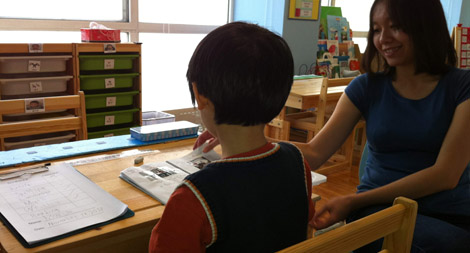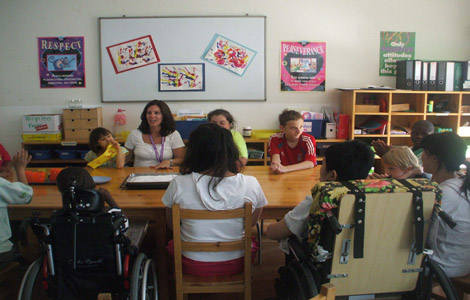Life
For a place in the sun
By Tiffany Tan (China Daily)
Updated: 2010-11-23 08:13
 |
Large Medium Small |
|
 The Rainbow Model plans to offer a more affordable home-teaching service in 2011. Tad Pu / For China Daily |
An expat couple who are finding it difficult to provide help for their autistic son highlights the need for more affordable English-language special education. Tiffany Tan reports
Ben had a sense of relief after learning his 8-year-old son's apparent lack of empathy, difficulty concentrating on schoolwork and tendency to fixate on certain things were attributed to Asperger's syndrome - a mild form of autism. "Now, how are we going to fix it?" was the 33-year-old IT-support worker's response. Four months later, he and wife Elena, 36, a teaching assistant at an international school, are still looking for the answer.
The Southeast Asian couple, who requested their real names not be published, are foreigners in Beijing, but earn local wages. The required after-school therapy costs about 3,600 yuan ($542) per month, which they can't afford.
As a result, the couple has been homeschooling their son since September, until a better and more affordable alternative can be found.
"Maybe for other expats it's a piece of cake," Ben says.
"But for employees like us, our children aren't provided medical insurance ... Our companies don't care."
Short of changing jobs, or moving to another city or country where English-language therapy and special education (SPED) are more accessible, what options do families like theirs have?
"Very poor options," says Dr Tad Pu, a United States-trained autism specialist and SPED teacher, who became interested in the field as a young doctor in Nanjing, in 1987.
He says almost every district in Beijing has a public school that offers SPED classes, but they're all taught in Chinese.
In January, Pu opened The Rainbow Model, a learning and tutoring center for both Chinese and foreign children with autism and related developmental problems. Half-day SPED classes, five times a week, are 10,000 yuan a month.
Now, he is on a mission to train teachers who can conduct lessons at students' homes. Most of all, the program aims to offer less expensive services.
"We're looking at 200 to 300 yuan per hour. It depends on who's doing it. For local Chinese, we will maybe have lower fees," Pu says. Such services by The Rainbow Model currently cost 300 to 500 yuan an hour,
Pu is planning to launch the home-teaching service by the end of 2011 and he is recruiting local and foreign teachers to train.
The principal of The Care for Children special-needs international school acknowledges the limited affordable options for foreign, special-needs students in Beijing.
"The bottom line is there are really no good options," says Dennis McKibben, who has taught at special-needs schools in Egypt, Japan and his native US. "There are no public schools, obviously, for English speaking (students). And so by definition, pretty much any other school is going to be private, that is charging money."
The Care for Children School charges a base tuition of 35,000 yuan ($5,271) per trimester for a half-day curriculum and 53,000 yuan for a full-day one.
"English special education, like English education as a whole in non-English speaking countries, is expensive because professional, fully qualified staff and quality resources are expensive," says Anita Franklin, owner and director of Side by Side, a consulting company that helps create individualized programs for children with special needs.
"It is unfair to expect those working in the special needs field to accept less than they would elsewhere just because there is a need in China," she says.
"There is a need for staff in the field of special education in every country, English speaking countries included."
The Care for Children School, besides running four classes that cater to students with various physical, psychological and educational difficulties, also introduces support groups to non-students who have trouble with social skills. The participants, boys aged 8 to 15, meet in two groups once a week and pay 250 yuan for the one-hour session.
"They try recreation because that's a good ice breaker," McKibben says, "so they're either playing ping-pong, football, or other games. But all the time that's going on, it's a form of group therapy, where they're working on social skills.
"While the boys are in the social group setting, the parents are sitting and having their own," he says. "It is nice for us all to be able to sit down and talk with people who can understand what we're going through and offer advice."
McKibben's 13-year-old son and only child has autism and goes to The Care for Children School.
McKibben says the school is trying to explore more options to assist families with limited financial resources. So far, it has offered scholarships to two students and hopes more will become available.
"People could donate and that money could go to one scholarship slot, so that could directly offset the tuition of somebody," he says.
McKibben, Franklin and Pu say their doors are always open to families who want help in exploring alternatives for their special-needs children.
"I've been doing this work for 20 years. I know how hard it is for parents," Pu says. "They're really desperate."
In the four months since Ben and Elena's son's diagnosis they've built a collection of books on autism, they continue to consult with experts about their options and they are determined to face the challenges of their son's disability as a family.
"If it really doesn't work out and we know that he definitely needs much more specialized care ... we can't afford Beijing anymore, we'll have to look at all the other things, like moving," Ben says. "Wherever we can find work and afford his education."
|
 The Care for Children School has offered scholarships to two special-needs students. Xu Jing / for China Daily |